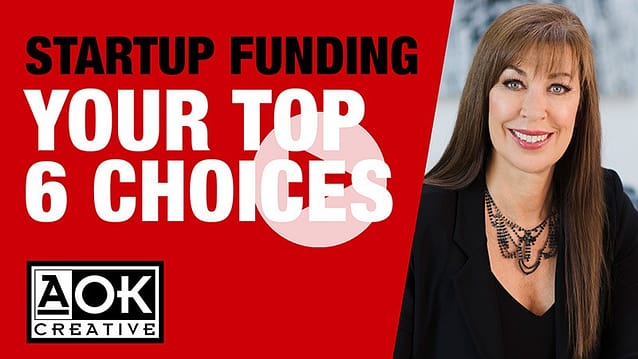Did you know that a majority of small businesses use some form of funding to get started? So if you are out there looking for capital you won’t be alone when you search for funding options. Today I’m making it easy for you and giving you six easy options to consider.
Read on to find out more, or watch the video below for more information.
We’re going to start with what looks like the least risky option...
1. Funding your business yourself
As long as you aren’t in an industry that requires a great deal of capital, like manufacturing, it may be possible that you could fund your own business. Either by using your savings or your personal credit card.
This isn’t a bad option because you retain control of your business and can jump right in without having to worry about pitch decks and the time consuming search for investors. The joy is, you can be flexible with your plans and change direction without consulting anyone.
Investors will also be impressed with you for having the confidence to back yourself.
There are some downsides though. Unless you’ve won the lottery, your funds will be pretty limited and once it’s spent you will no longer have a personal financial safety net. This will put you under pressure to find the revenue to cover your personal and business overheads.
Next up...
2. CROWDFUNDING
There have been some fantastic success stories come out of crowdfunding companies like Kickstarter and Indiegogo. One successful example is Oculus VR. After their campaign, they had over 9.500 backers and had raised over $2.4 million. It helped that they were eventually bought out by Facebook.
If you aren’t setting your sights so high, you can take a leaf out of Popsockets book. They had 520 backers and raised $18,000 but went on to make grow to revenue of over $200 million.
Sounds like a really great option however crowdfunding has become congested and the platform fees can be quite high. You also have to have all your ducks in a row as it requires a strong marketing and investment strategy to succeed. Your video pitch will need to be spot on to catch the attention of potential investors and you will need to back that up with a great website and the help of a clever PR company.
You could take the traditional route and get a...
3. BANK LOAN
It’s the road most often travelled but rules out start-ups as you’ll need to have been in business for a number of years so that you can prove you are a viable business with strong annual revenue. The other side of the coin is, you’ll need to have an excellent credit rating.
If you can swing it, you have the advantage of not having given up any equity in your business and, again saved time having to create a pitch deck and hit the road looking for investors.
Have you thought about asking..
4. FAMILY AND FRIENDS
As a capital raising opportunity, this isn’t such a bad idea. After all, they will be much more forgiving if it takes longer than expected to achieve your goals. It’s also a great opportunity to practice pitching to a warm audience before you hit the road looking for an angel investor. It will also give you an opportunity to look at what form the funding is going to take. Either as a loan or as equity in the business.
That doesn’t mean you get to relax your approach when pitching to family and friends. You’ll still need a good business plan and a stunning pitch deck so they can understand your plans and are clear about the risks.
Another option is finding an...
5. ANGEL INVESTOR
They are your next option after you’ve done your fundraising with family and friends. They tend to invest in you as the founder and the idea, rather than the financials. In other words, they get caught up in the passion of you and your idea.
You’ll need definitely need to have a compelling pitch deck and business plan for this approach. You’ll also need to practice your pitch so that it is compelling. You might want to check out my video How to Improve Your Pitch Deck (BE PASSIONATE, POWERFUL, PERSUASIVE)
Angel investors are a great source of funding as they tend to play a passive role in your business. You just have to bear in mind, you could be working with inexperienced investors that aren’t qualified to help or advise you but still may try. It’s at this point you may have to give up some equity in your business.
If you’ve been in business for at least a couple of years, you might want to consider looking for...
6. VENTURE CAPITAL
If you are at this point, you will have made sales and have greater insight into your market and your business. This will be important, as venture capitalists tend to want opportunities that are scalable and cash flow positive.
The funding is usually for larger amounts making this the most powerful option. Having a venture capitalist on board will mean your due diligence and funding processes will be in order and you will be adding some very capable people to your board. This will give you a spike in the credibility stakes and if done right, attract some media attention.
When you are out there looking for a venture capitalist, don’t forget it can take a lot of shoe leather to find the first investor. I hate to say it, but no one wants to be the first. Once you’ve accepted the equity you will then be working towards shared goals and timelines, and that can take a little getting used to.
Finding investors can be daunting and can take many years but don’t forget, you are following your dreams so keep on pitching with passion.
You’re just one pitch away from success!


